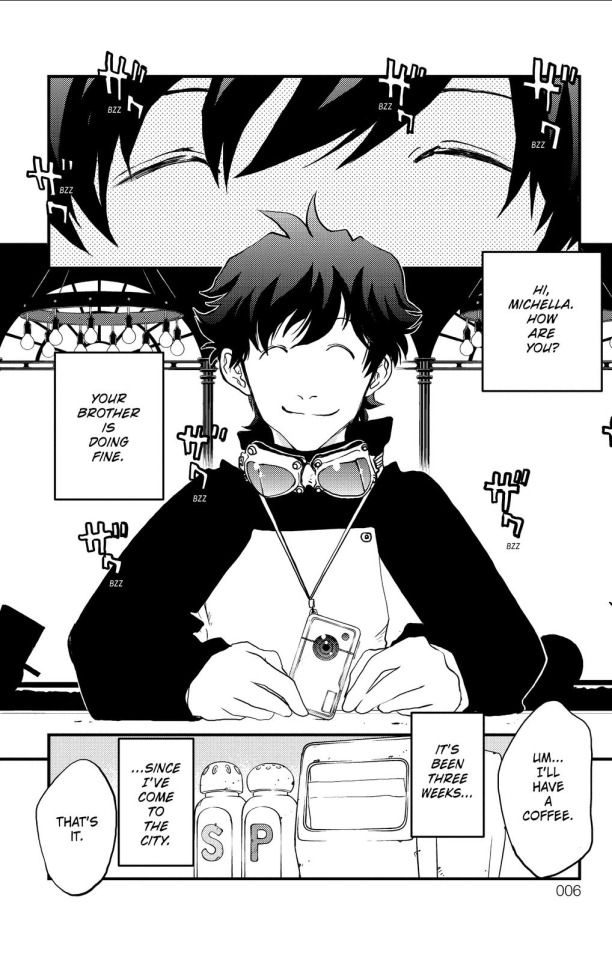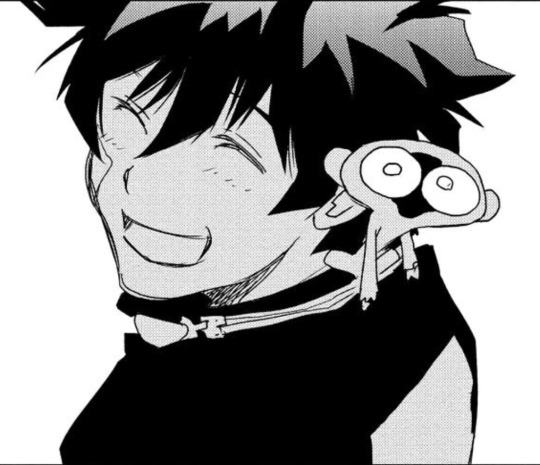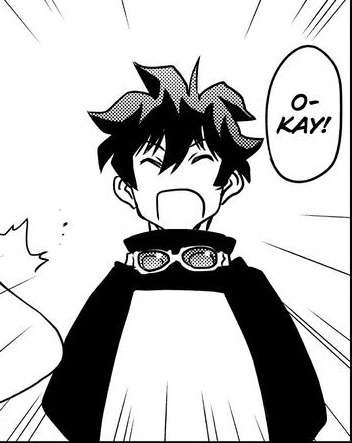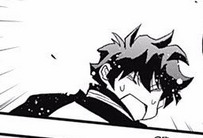#he also looks so content in his first appearance compared to like the immediate whiplash of him actually being like
Explore tagged Tumblr posts
Text


i think its great looking at the first appearances of leo vs the ones after nightow finally got into the swing of drawing him because he had like. a distinct learning curve on the most part. but then there are some things that just never changed. like so:






#kekkai sensen#.text#he does however swear noticably less#he also looks so content in his first appearance compared to like the immediate whiplash of him actually being like#depressed and filled with a sad amount of guilt and despair yada yada yada#which just amuses me#like i think sonic monkey stealing his camera is just what broke the bridge there#might as well fall face first into the self depracation fest you know. leo is so good at that#the immediate ^_^ im starving and poor but im enjoying my time here! to :/ i dont deserve any kindness in my life#was great. thanks nightow
15 notes
·
View notes
Text
In Sherlock’s Room, Part Two
Part One Be Here
Title: In Sherlock’s Room Rating (for this half): PG Total Word Count: 6431 Pairing: bi Watson/ace trans Holmes Universe: Modern AU of the original canon Summary: Holmes solves a case in his jammies. Watson does laundry and makes ravioli.
TW for this half: very vaguely implied past acephobia; another mention of past acephobia (probably past transphobia also) which is immediately followed by petty revenge
Editing was tedious work. My editor, for all his many redeeming qualities, invariably failed to appreciate the flowery endings to my tales and insisted I cut them off far earlier than I should have preferred.
“People read your stories for two reasons,” he once told me after nearly a half-hour of increasingly stormy debate on the subject; “the mystery, and the solution to the mystery. No one cares what happens to you once the crook is sitting in a jail cell. You can spend the night giving each other gob-jobs for all anyone cares. Oh, I’ve said something funny now, have I?”
The bundles of fan mail I received every week inquiring as to whether I was single and whether Holmes was any good at finding hidden sausages made me question his judgment, but I was paid very handsomely for my work. I could afford to assume that he had been made editor for a reason.
My efforts to curtail the offending epilogues on my own proved futile and so I had given up altogether, allowing my fingers to stretch the story for as long as they pleased, knowing that my editor would cut it all anyway while cursing my name. I was well into an appallingly purple passage in which Holmes and I compare the seasonal changes of the leaves to the arc of the average criminal’s career when Holmes burst in, catching the door before it could slam into the wall.
“Ceromancy!” he cried.
“Gesundheit,” I said.
“Kommst du mit, Naseweis.”
One did not need to speak German to understand what he wanted. I followed him back to his room. He had turned on some music since I left, a whiplash-inducing blend of classical pieces and Eurovision finalists. Several new items had taken up residence on his desk. His laptop now sat amongst the clutter rather than on his bed, along with a large, overly fragrant lavender candle, either borrowed or stolen from Mrs Hudson, and a bowl of water with a vaguely egg-shaped bit of hardened wax floating in its centre.
“I take it this is somehow connected with cera… ciril—”
“Ceromancy. It is the art of divining the future via wax images in water. One of the methods involves adding certain ingredients to the water, including seeds of the cuminum cyminum, which Mrs Mulvehill reports smelling in her wife’s vehicle on more than one occasion, and sprigs of ruta graveolens, a toxic herb that can cause blisters.”
I recalled the neatly torn note in the package that had started Holmes’ day, in which Mrs Mulvehill remarked upon the blisters on her wife’s hand.
“Further,” Holmes continued, “this particular set of instructions involves tying two candles together with a red ribbon.”
He spun the laptop so I could see the screen, though I hardly needed to look to know what would be there: the photograph of the red ribbon tied to the rearview mirror.
“That looks about long enough to bind a pair of candles, does it not?” said he.
I thought it strange that a woman should drive five hours one way every weekend simply to have her fortune told, and said so to Holmes.
“I have not yet finished examining all of the evidence. There may very well be another explanation for these clues that will become apparent once I reach the end of my investigation.”
“So there is still a chance that Polly Mulvehill is seeing another woman?”
“Unfortunately for our client, yes.”
He lifted a hand to swipe to the next photograph, then gave it a second thought and turned to me instead.
“Why do people do it?” he asked.
“Do what?”
“Cheat. Polly Mulvehill has a perfectly devoted and intelligent wife, but that wasn’t enough for her. She still felt the need to fill her time and, presumably, various other things with someone else, all in pursuit of a few sweaty, sticky moments on a flat surface. What can possibly be so thrilling about sex that it drives people to betray those closest to them? It can’t be any better than a concert at the Barbican, and I wouldn’t cheat on you for a box seat.”
That hadn’t ever been a concern of mine, but it was nice to know.
“Sex is pleasurable for a lot of people,” I said, “and for some, it confers a certain status that concert tickets don’t. It makes them feel powerful, attractive, special, even loved—”
“That hardly justifies cheating.”
“Of course it doesn’t. I suppose some people never learned the same sort of self-control that you have with regard to box seats.”
He laughed at the jab and began setting up his chemical apparatus as the delicate dénouement of Gluck’s Melodie ceded to the gravelly bombast of Lordi’s Hard Rock Hallelujah.
“What are you going to do now?” I asked.
“I must test the dirt samples sent to me by Mrs Mulvehill to determine if there is anything distinctive about them. The definitive answer to the question of how Polly Mulvehill has been spending her weekends may well be lurking in one of these test tubes.”
He muttered a few more disparaging comments about unfaithful spouses before returning to work. I sat on the edge of Holmes’ bed and ran a finger along a seam in his blanket. It had some peculiar stains that I would have to remember to ask about, to make sure he wasn’t slowly poisoning himself in his sleep. Not for the first time, I was grateful that we had elected to retain separate bedrooms even after starting our relationship.
At that time it had been almost a decade since I last slept with someone. Her name was Allie, or something like it. She was tall and dark and sarcastic and just barely passable in the bedroom. I suppose it was the lingering memory of her mediocrity that helped reinforce the idea of there being more important elements than sex in a romantic relationship when Holmes wrote me the first of what would become an entire drawerful of love letters. He made it clear from the very start that he could offer me every sort of intimacy except that one, but that does not make our relationship in any way less. Maybe it’s the fact that I will never have the chance to confront this issue in my published works that compels me to be perfectly clear about it here: we are lovers, in every sense of the word except that one upon which our society places the most importance.
Well, I suppose I shouldn’t judge others for their ignorance. I held a similar view in a past life. “Experience of women on three continents” was, despite what my editor prefers to believe, not an exaggeration. Nor is it an exaggeration to say I have never once regretted abandoning my old ways. Who wouldn’t give up sex for love?
Perhaps not Polly Mulvehill. Or perhaps she really did learn her lesson and would agree with me after all. It seems to me such an obvious decision, but on those infrequent occasions when I have attempted to explain our relationship to an outsider, I am almost inevitably met with disbelief at best. Mrs Hudson took it in her stride, bless her, but Lestrade got very confused when I responded to his barely veiled innuendos with the truth. I am slightly ashamed and very satisfied to say that I went for the jugular almost immediately.
“If your wife got sick and wasn’t able to have sex with you anymore, or if her hormones change as she gets older and her libido drops, which does happen by the way, would you walk out on her just because she wasn’t giving you any?”
“Of course not!” To Lestrade’s credit, he looked scandalised at the very suggestion. “She’s my wife, the mother of my children—”
“It’s the same with us. Well, not exactly the same. Obviously, there are some differences in our lines of reasoning, but my point is that you love your partner more than you love sex and so do I. That is, I love my partner more than I love sex, not your partner. You know what I meant,” I said, irritated, when he started laughing.
“You’re much more eloquent as a writer than as an orator,” he replied, but he bought me a pint as an apology and we never spoke on the matter again.
I suppose I could have laughed along with his jokes instead of lecturing him on asexuality, but I should have felt guilty allowing him to continue operating under the assumption that Holmes and I were doing it. The mere idea of engaging in such activities makes Holmes so terribly uncomfortable. Having to endure ribald ragging, no matter how good-natured, from the one police inspector he respects could only end unpleasantly for both parties.
Feeling suddenly maudlin, I moved my bad leg so it rested fully on the stained blanket, leaned back against the headboard, and watched as Holmes went about his work. His hands, despite appearing ill-fittingly large on his slender wrists, always managed to look graceful when engaged in one of his chemical experiments. But I suppose everyone looks more themselves when they are doing what they are best at.
I believe I drifted off a bit after that, lulled into a contented daze by the rhythm of clinking glass and the scratch of pencil on notebook paper. I began to come out of my trance when he came out of his. He tried and failed to control a smile. A few scribbles later and he gave up all pretense of dignified detachment, jumping in place and clapping, sending the pencil clattering into the dustbin beside his desk. That was alright. He preferred to keep his writing implements in there anyway.
With but a short moment of warning he swept me into his arms, then released me and tugged me towards his desk before I had the chance to hug him back.
“This is far better than I could have hoped for! What a splendid case this has turned out to be!”
“Such excitement for a bit of dirt,” I remarked.
“No mere ‘bit of dirt’ is this. Have a look at the results of the soil analysis I ran.”
I did as he asked. Even with my limited understanding of soil composition, I knew at once what had brought the light to his grey eyes.
“Iridium?”
“Yes. It is exceedingly rare on Earth but much more common in meteorites.”
“I know what it is. I just didn’t think you would, given your extreme disinterest in astronomy.”
“I looked it up,” Holmes said, witheringly. Then, perking up, he added, “I suspect the sample in Polly Mulvehill’s boot came from such a meteorite, or perhaps from an object that was found within the iridium anomaly.”
“You did say she works at a museum.”
“She volunteers as a tour guide. I rather doubt she has the authority to take archaeological treasures home with her.”
“So you’re saying—”
“Museums are a study in contrasts, my dear Watson. In their exhibition rooms, they are well-organized, often beautifully laid out bastions of knowledge dedicated to preserving the past into the future. However, safely shielded from the public eye is invariably an overcrowded and poorly catalogued backroom littered with valuables that could be missing for months or years before anyone noticed. Why, I stole this very spoon from the British Museum over a decade ago and still they’re none the wiser!”
“Holmes!”
“Oh, come now, Boswell. This is a soup spoon from my mother’s flatware collection. Do you really think so little of me?”
“On the contrary, I think highly enough of you that I expect you could abscond with the British Museum’s entire collection of Egyptian antiquities and return them to Egypt before the guard could leave his chair. Why do you have your mother’s soup spoon?”
Holmes abruptly stopped preening at my inquiry.
“After my last visit to Sussex, you asked why I was in such a strop and I wouldn’t tell you.”
“Yes?”
“She kept asking when you and I would give her grandchildren. I should have run out at once and arranged for a hysterectomy if Mycroft hadn’t been there to stop me. Instead I took her soup spoon. Are you very angry with me?”
“Not with you, no.” But the next time I was misfortunate enough to encounter Mrs Holmes, I thought I might distract her long enough for Holmes to make off with the rest of her flatware, and possibly a vase or two. I did not tell him the specifics of my thoughts, instead running a careful hand through the tangles in his hair. He was much more appreciative of such gestures when not occupied by a case. Had I attempted to demonstrate any form of affection prior to the discovery of the iridium, he should have pulled back and shook his head, putting a stop to my ministrations. Now, he not only permitted the display, he encouraged it, throwing back his head with a contented sigh. He grasped my free hand with both of his, enjoying the light scratch of my callouses across his own, eyes closed so he could focus on the sensation.
At length he straightened in his chair and looked around, as if in search of something.
“I believe we have gotten rather off the subject,” he said. He crowed with victory when he made visual confirmation of his laptop teetering precariously on the edge of his desk, where it had been shoved to make room for the chemistry equipment. “I must get in touch with Mrs Mulvehill—Mrs Evelyn Mulvehill, that is—and alert her to the happy news.”
“I would hardly call the fact that her wife is stealing from her place of employment happy news, Holmes.”
“Perhaps not to you or I, but to a woman bracing herself for the news that her beloved has yet again been unfaithful, it may well be the highlight of her day.”
I never saw Evelyn Mulvehill’s response to the longwinded email Holmes sent containing his deductions, but Holmes informed me it was cordial and grateful and would I please stop scribbling in my notebook? He had just learned the most wonderful new waltz that I was sure to love if only I’d pay it the attention it (and he) deserved.
We did not hear from the Mulvehills for nearly a fortnight. At that time, as a harsh rain assaulted the streets and the rooftops of London, Holmes thrust an open envelope, sent from Kendal, Cumbria, under my nose. Along with her cheque came a letter from our former client, thanking Holmes for his help and informing us of the full meaning behind the clues he had deciphered for her. Evelyn confronted her wife about the matter the moment she returned from work on the day of Holmes’ revelation. Polly, to her credit, admitted to the scheme at once, but the story which followed her confession was one that neither of us could have expected.
Polly Mulvehill loved her museum and the history it saved and displayed, but the longer she worked there, the more she realised how dependent it was upon artifacts illegally obtained when Britain was at her most imperialistic. What right did any museum, even the one she held so near and dear, have to keep such items? She made then a vow to smuggle what she could out of the museum and back to the lands from which they had been taken.
She sought out a fence, a man based in Aberdeen who was very superstitious and insisted upon consulting a friend who specialised in divination, including ceromancy, before each and every step of their exchange. At least twice, to Polly’s intense displeasure, the fence interpreted the candle drippings negatively and refused to accept the goods, forcing Polly to return with the stolen artifacts to Kendal until the following week. Still, the trouble was worth it, Polly Mulvehill insisted, for the fence was just as devoted to repatriation as she and would do most anything, so long as the candles gave their blessing, to bring the haughty English down a peg. Upon receipt of the stolen items, the fence made his escape on a flight from Aberdeen International Airport, which Polly only made the mistake of booking a hotel next to once, compared with the eleven times she had travelled to Aberdeen on her self-imposed mission. One was also the number of times she made the mistake of handling the herbs which the fortune teller used to predict their chances of success.
Evelyn was so awestruck by her wife’s courage and integrity that she quit her accounting job and started an organisation dedicated to negotiating the legal return of all stolen artifacts to their countries of origin. It is an organisation the Mulvehills run to this very day. The missive ended with a plea veiled as a compliment, stating that Evelyn Mulvehill knew Holmes to be a gentleman of the utmost discretion, and that she trusted him to breathe not a word of her wife’s rashness to the authorities. The final item enclosed in the envelope was a familiar, stout red ribbon. Holmes smiled when I held up the ribbon and requested I put the note into the fire.
“Another mystery over and done with,” said he, snapping the blinds shut against the sight of the driving storm. “Will you be writing up this case for your eager public?”
“I doubt it. I spent more time folding your laundry than doing anything related to the case. Perhaps I could end it with a big car chase through Aberdeen between us and the superstitious fence. Maybe throw in the Mulvehills for good measure.”
Holmes chuckled around the empty pipe in his teeth.
“It is no more or less ludicrous than anything else you have written,” he said.
I chose to interpret this remark in a positive light.
Were this a polished and published work rather than a hastily scribbled collection of remembrances in a shabby moleskin notebook, my editor should have ended the account with my destroying the evidence of Polly Mulvehill’s crimes and her wife’s complicity. It is just as well. Holmes is, despite the great fame I have inadvertently thrust upon him, an intensely private man. I doubt he would appreciate the whole of the English-speaking world reading about how we sat together on the sofa, shoulder to shoulder and hip to hip, he kneading the pain from my bad leg with a practiced hand, I reading selections from the story I had been editing and taking note of the parts he disapproved of. He certainly wouldn’t want anyone else knowing about how our light bickering over whether or not I was allowed to describe him as gentle ended in several minutes of kissing that served my argument rather better than his. And, most of all, he would recoil at the slightest possibility of strangers spying after the fact as he pulled out his laptop and helped me work out plans for a weeklong holiday in Cumbria.
5 notes
·
View notes